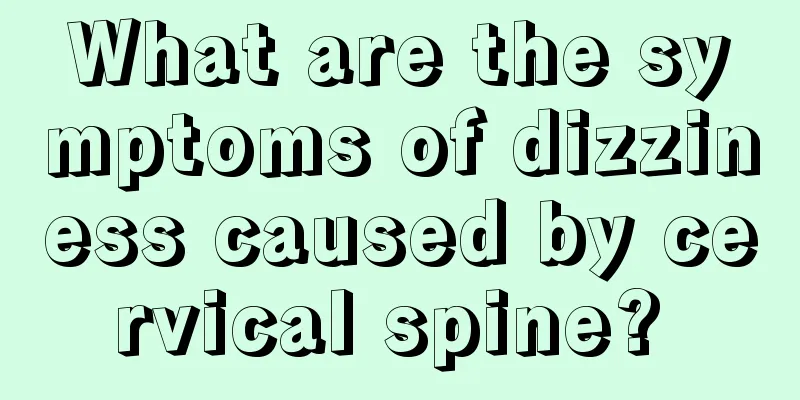What causes belching, nausea and vomiting

|
Belching is commonly known as burping or burping after a meal. If this phenomenon occurs occasionally after a meal, it is caused by eating too fast and swallowing a lot of air. It is a normal phenomenon. If belching occurs frequently, you must pay attention to it. When belching occurs, it means that there are some problems with the digestive function of the spleen and stomach. You need to adjust your eating habits in time or go to the hospital for examination. What should you pay attention to when you have belching? ① Avoid eating raw, cold and indigestible food. Also be careful to eat less sweet and sour food, because sweet food can fill up the stomach and easily cause belching. ② In daily life, you should pay attention to keeping away cold and moisture, and avoid getting cold. In particular, you should protect the stomach to prevent the Zhongyang from being damaged. ③ Pay attention to regulating your temperament, don’t hold grudges, be cheerful, and be willing to resolve the tedious matters you encounter in life, instead of keeping them in your heart. ④At the same time, actively treat spleen and stomach diseases to ensure early recovery. This is also a positive measure to prevent belching. Symptoms of belching 1. Food stagnation and belching: accompanied by sour and rancid odor, muffled belching or nausea, discontinuous belching, chest and abdominal distension, loss of appetite, sour and rancid odor in stool or constipation, thick and greasy tongue coating, and slippery and solid pulse. 2. Belching that is deep and intermittent, without a sour or rancid odor, and accompanied by poor appetite, is mostly caused by stomach deficiency and qi reflux, which is common in the elderly or people with long-term illness and physical weakness, and is a deficiency syndrome. 3. Belching is deep and intermittent, without sour or rancid odor, and is accompanied by poor appetite. This is mostly due to weak stomach and qi reflux, which is common in the elderly. 4. Belching due to weak spleen and stomach: intermittent belching, weak belching sound, vomiting of clear water, loss of appetite, pale or sallow complexion, pale tongue with thin white coating, and weak pulse. 5. Liver Qi invading the stomach and causing belching: frequent belching, loud belching, chest tightness and discomfort, dull pain in the ribs, thin white tongue coating, and wiry pulse. Causes of belching 1. Gastroesophageal reflux disease (GERD) Bile reflux gastritis, eating too much, the stomach cannot be emptied on time, food accumulates in the stomach for too long, causing belching. Some GERD patients do not have common typical symptoms such as heartburn and reflux, but may have atypical symptoms such as belching, chest pain, upper abdominal pain, and upper abdominal burning sensation. 2. Mental stress Depression can also affect the sympathetic nerves, making them overly tense, inhibiting the gastric motility and emptying function, causing stored food to remain in the stomach for too long, leading to the production of fermented gas. 3. Bad diet and lifestyle habits Eating too much radish, potato, sweet potato, chestnut and other foods, or staying in bed for a long time, working at a desk for a long time, and lack of physical activity can also affect gastric emptying. 4. Gastric outlet obstruction Belching is a common complication of duodenal ulcer, also accompanied by upper abdominal distension and discomfort, anorexia, nausea and vomiting. 5. Hiatal hernia Belching often occurs after eating and is often accompanied by heartburn, acid regurgitation, and abdominal bloating. Patients often complain of dull pain under the sternum or in the precordial area, which may also radiate to the shoulder. Other symptoms include difficulty swallowing, nausea, weight loss, difficulty breathing, shortness of breath, coughing, and bad breath. 6. Peptic ulcer It is a common disease that often causes belching. The basic symptoms are heartburn and burning stomach pain. Duodenal ulcers cause pain on an empty stomach and in the middle of the night, which can be relieved after eating or taking antacids or drugs to reduce secretions. Gastric ulcer causes pain half an hour after a meal and is relieved before the next meal. Accompanying symptoms and signs include difficulty swallowing, nausea, vomiting, black stools, abdominal distension, feeling of fullness, and upper abdominal tenderness. |
<<: Can rabbit plague be transmitted to humans?
>>: Quick solution to belching
Recommend
There is a big pimple on my arm
Many friends found a lot of small bumps on their ...
The difference between spondylitis and spondylitis
The spine and vertebral column are actually two d...
How is onychomycosis transmitted? Women should be careful when getting their nails done
Everyone should know about onychomycosis, and it ...
What are the symptoms of advanced lung cancer? These two points need attention
There are many symptoms of advanced lung cancer. ...
Can bone cancer be cured? It may be cured in the early stage, but not in the middle and late stages
The prognosis of bone cancer varies according to ...
The difference between sanguine and choleric
Everyone has different personality traits, but so...
What is the reason for low urine volume? Do you know these?
Low urine volume is a very serious disease. Many ...
What to do if you have choking cough after laryngeal cancer surgery
Food is the material basis for the patient's ...
Facial massage to remove wrinkles
Wrinkles can be said to be a symbol of our skin a...
Side effects of hazelnuts
Everyone knows that eating nuts is very good for ...
What is whale oil used for
Whale oil is taken from the body of a whale. We k...
What does the esophagus mainly refer to?
We all know that the food we eat is transported i...
What harm does lymphoma do to the body
We can also call lymphoma a malignant lymphoma. T...
Will thyroid cancer metastasize if it is not treated for more than half a year?
Thyroid cancer is a malignant tumor that originat...
How harmful is tongue cancer?
How harmful is tongue cancer? The early symptoms ...









